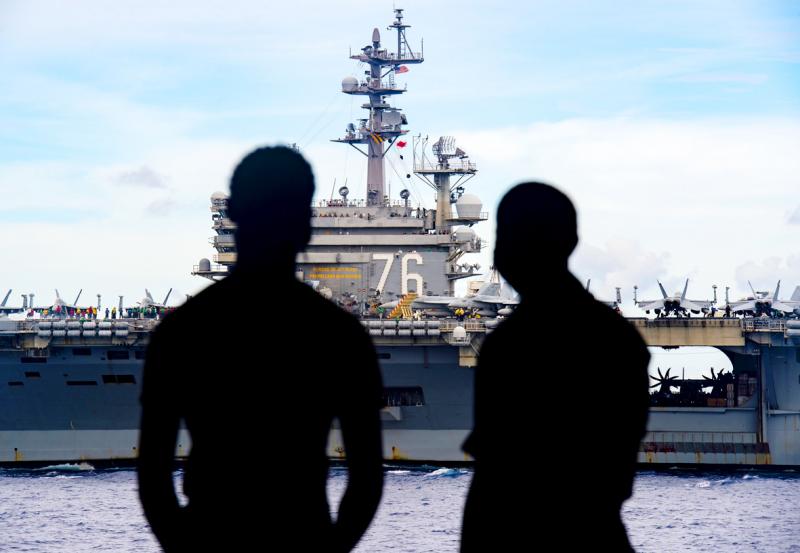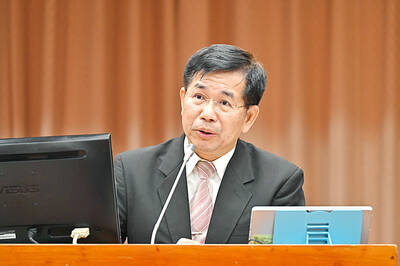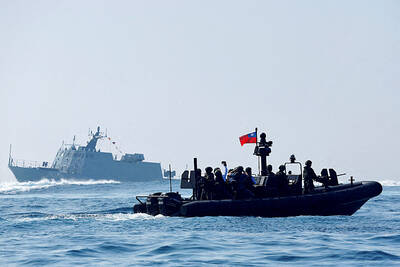Beijing yesterday slammed Washington’s “tyrannical logic” over the latest US sanctions targeting Chinese expansionism in the South China Sea, worsening tensions between the two superpowers.
China has aggressively pursued its territorial claims in the South China Sea, building small shoals and reefs into military bases with airstrips and port facilities.
The US and Chinese militaries have ramped up their activity in the region.

Photo: EPA-EFE / Seaman Dalton Reidhead
The US on Wednesday announced sanctions on two dozen Chinese companies and associated unnamed officials for taking part in building artificial islands in disputed waters.
However, Chinese Ministry of Foreign Affairs spokesman Zhao Lijian (趙立堅) denied at a regular news briefing yesterday that the construction work had anything to do with Chinese militarization, saying that it was within the scope of territorial sovereignty.
“The US’ words grossly interfere in China’s internal affairs... It is wholly tyrannical logic and power politics,” Zhao said. “China will take firm measures to uphold the legitimate rights and interests of Chinese companies and individuals.”
The US Department of Commerce said that the companies “enabled China to construct and militarize disputed outposts in the South China Sea.”
The Chinese have recently conducted military exercises in the area, while the US Navy has undertaken regular “freedom of navigation operations” to assert its rejection of Chinese sovereignty by sailing near islands that Beijing claims as its own.
China’s military on Tuesday accused the US of deliberately flying a U-2 spy plane into a no-fly zone to disrupt live-fire drills by the People’s Liberation Army.
In July, the US formally declared Beijing’s pursuit of territory and resources in the South China Sea as illegal, explicitly backing the territorial claims of Taiwan and other Southeast Asian countries against China’s.

The International Industrial Talents Education Special (INTENSE) Program to attract foreigners to study and work in Taiwan will provide scholarships and a living allowance of up to NT$440,000 per person for two years beginning in August, Minister of Education Pan Wen-chung (潘文忠) told a meeting of the legislature’s Education and Culture Committee yesterday. Pan was giving an update on the program’s implementation, a review of universities’ efforts to recruit international students and promotion of the Taiwan Huayu Bilingual Exchanges of Selected Talent (BEST) program. Each INTENSE Program student would be awarded a scholarship of up to NT$100,000 per year for up to

BASIC OPERATIONS: About half a dozen navy ships from both countries took part in the days-long exercise based on the Code for Unplanned Encounters at Sea An unpublicized joint military exercise between Taiwan and the US in the Pacific Ocean last month was carried out in accordance with an international code, the Ministry of National Defense (MND) said yesterday. According to a Reuters report citing four unnamed sources, the two nations’ navies last month conducted joint drills in the Western Pacific. The drills were not made public at the time, but “about half-a-dozen navy ships from both sides, including frigates and supply and support vessels, participated in the days-long exercises,” Reuters reported, citing the sources. The drills were designed to practice “basic” operations such as communications, refueling and resupplies,

‘MONEY PIT’: The KMT’s more than NT$2 trillion infrastructure project proposals for eastern Taiwan lack professional input and financial transparency, the DPP said The Democratic Progressive Party (DPP) caucus yesterday said it would ask the Executive Yuan to raise a motion to oppose the Chinese Nationalist Party (KMT) caucus’ infrastructure proposals and prepare to file for a constitutional interpretation if the KMT-dominated legislature forces their passage. The DPP caucus described the three infrastructure plans for transportation links to eastern Taiwan proposed by the KMT as “three money pit projects” that would cost more than NT$2 trillion (US$61.72 billion). It would ask the Executive Yuan to oppose public projects that would drain state financial resources, DPP caucus secretary-general Rosalia Wu (吳思瑤) said. It would also file for

SELF-SUFFICIENCY: The project would only be the beginning, as Taiwan needs at least 120 satellites to ensure uninterrupted communication, Wu Tsung-tsong said The Taiwan Space Agency (TASA) yesterday said it plans to launch six low Earth orbit satellites starting in 2026 as part of the government’s plan to boost the resilience of the nation’s communications. The development of the technology gained attention after Ukrainians were able to access the Internet through Space Exploration Technologies Corp (SpaceX) CEO Elon Musk’s Starlink satellite service, despite their infrastructure being severely damaged in the war with Russia. Two of the satellites would be built by the government, while four would involve cooperation between TASA and private contractors. “Over the past 30 years, the satellite technology in Taiwan has